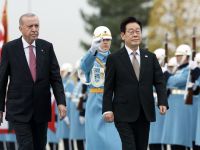Talks to wrap up the UN's climate change pact opened here Monday with an appeal to the United States to abandon unilateralism in the light of the September 11 terrorist attacks.
Outgoing conference chairman Jan Pronk said the assaults on New York and Washington "have put international relations into a new light.
"International cooperation is needed if we are to solve world problems," he said.
"The greatest threat to security and stability lies in socio-economic inequality, political marginalisation and neglect of values.
"International cooperation is an ongoing process. No country can do it alone. Together we can move forward provided that we take account of each other's interest," said Pronk, who is Dutch environment minister.
Pronk did not name names, but delegates said his remarks were clearly aimed at the United States, which rejected the Kyoto Protocol in March, igniting criticism around the world.
Kyoto was one of a flurry of multilateral agreements contested or abandoned by President George W. Bush in the first seven months of his presidency.
Since September 11, his administration has emphasised international cooperation in its endeavour to build a coalition against terrorism. It has called for help from NATO and its allies in the Muslim world, sought a united front to sever terrorists' money links and paid its back dues to the United Nations.
Kyoto, an offshoot of the 1992 Rio Convention, is the most ambitious international environment treaty ever attempted.
It sets its sights on "greenhouse" gases -- carbon-based emissions that mainly come from burning coal, gas and oil.
But its rulebook has been a bitterly-fought arena, preventing the pact from being completed and then ratified.
The Marrakesh talks, conducted among senior officials until November 6, and then environment ministers from November 7-9, aim to transform a political deal on the rulebook into a formal treaty that can be implemented in time for Rio's 10th anniversary next September.
The meeting is the first global gathering since the terror attacks wrecked the international conference schedule and cast a shadow over travel to Muslim countries.
"The fact that this conference is taking place is an unequivocal response to all those who believe they can stop the process towards understanding and peaceful resolution of problems," said the new chairman of the talks, Moroccan Environment Minister Mohamed El Yazghi.
Security was tight at the city's airport and avenues leading to the Marrakesh Conference Centre were sealed off. About a hundred UN guards were on security duty within the venue, which is United Nations soil for the duration of the meeting.
Between 3,000 and 4,000 people were expected to attend, and invitations have been sent out to 180 signatories, the organisers said.
Kyoto commits 38 industrialised countries to cutting their emissions of six gases back to 5.2 percent below 1990 levels by a 2008-2012 timeframe.
The protocol was saved at a gruelling session in Bonn in July that left the United States on the sidelines but at the cost of huge concessions.
Scientists say that so many billions of tonnes of greenhouse gases have been released through industrialisation that they are hanging like an invisible blanket around the Earth, trapping heat from the Sun and causing the Earth's atmosphere to warm.
The most prestigious scientific authority, the UN's Intergovernmental Panel on Climate Change (IPCC), projects a temperature rise of anywhere between 1.4 and 5.8 C (2.5 to 10.4F) from 1990-2100.
This will cause a rise in sea levels through melting polar ice and thermal expansion of between eight and 88 centimetres (five and 55 inches), the IPCC believes.
Developing countries do not have a specific emissions-cutting target under Kyoto, something that Bush said was one of several loopholes which made the scheme "fundamentally flawed."
But Pronk said that even in the next Kyoto commitment session, after 2012, developing countries should still be given concessions.
"We must respect the principle of common but differentiated responsibilities," he said.
Washington has vowed to come up with its own scheme for tackling global warming.
But delegates said the White House has been too busy dealing with the September 11 crisis to focus on the proposals, even the broadest lines of which remain unclear -- MARRAKESH, MOROCCO, (AFP)
© 2001 Al Bawaba (www.albawaba.com)







